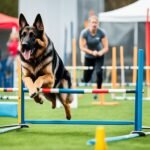Are you a proud parent of a Doberman Pincher? If so, you’ve chosen a remarkable breed – one that is loyal, devoted, and incredibly intelligent. From the moment our paths intersected with our Doberman, we knew we were embarking on a journey of unconditional love and unwavering companionship.
But we also understood that transforming our pup into a well-behaved member of our family required patience, dedication, and the right training techniques. We wanted to nurture their natural instincts, tap into their desire to please, and raise a dog who would not only accompany us on life’s adventures but also be our unwavering confidant.
That’s why we’ve compiled these Doberman Pincher training tips – to help you unleash the full potential of your furry friend, creating a strong bond that goes beyond the surface. Whether you’re looking to conquer basic commands or embark on advanced training, we’ve got you covered.
Key Takeaways:
- Transform your Doberman into a loyal and devoted companion through tailored training techniques.
- Master basic commands using positive reinforcement and consistency.
- Explore obedience training, behavioral training, and advanced techniques to strengthen your bond.
- Start training early to establish good habits and behaviors from the beginning.
- Understand your Doberman’s temperament to ensure effective training and a harmonious relationship.
Important Training Tips for Doberman Pinchers
When it comes to training your Doberman Pincher, there are a few key tips that can make a big difference. By following these important training tips, you can ensure that your Doberman becomes a well-behaved and obedient companion. Let’s dive into the essential training techniques that every Doberman owner should know.
Stick to a Schedule: Dobies thrive on routine and consistency. To make the most of your training sessions, schedule them for the same time every day. This will help your Doberman develop a sense of structure and make the training process more effective.
Use Positive Reinforcement: Doberman Pinchers respond exceptionally well to positive reinforcement. By rewarding good behavior with treats, praise, and affection, you can motivate your Doberman to learn and obey your commands. Positive reinforcement builds a stronger bond between you and your dog.
Start Early: It’s never too early to begin training your Doberman Pincher. In fact, it’s best to start training as early as six weeks old. By starting early, you can establish good behaviors and habits from a young age, setting the foundation for a well-trained dog.
Understand Their Temperament: Doberman Pinchers are known for their loyalty and devotion to their owners. To effectively train your Doberman, it’s crucial to understand their temperament and work with it. By tailoring your training methods to suit their personality, you can ensure more successful outcomes.
Remember, consistency and patience are key when training your Doberman Pincher. By implementing these important training tips, you’ll set your dog up for a lifetime of good behavior and a strong bond between the two of you.
| Important Training Tips for Doberman Pinchers | |
|---|---|
| Stick to a Schedule | Dobies love routine, so schedule their training sessions for the same time every day. |
| Use Positive Reinforcement | Dobermans respond well to positive reinforcement and treats. |
| Start Early | Start training your Doberman puppy as early as six weeks old. |
| Understand Their Temperament | Dobermans are loyal and devoted to their owners, understand their temperament and work with it. |
Obedience Training for Doberman Pinchers
Obedience training is crucial for Doberman Pinchers to ensure they become well-behaved and obedient companions. By teaching them basic commands and establishing consistent training techniques, you can shape their behavior and foster a strong bond with your furry friend.
The Importance of Obedience Training
Obedience training plays a vital role in the development of Doberman Pinchers. It helps them understand their place in the family hierarchy and establishes clear boundaries and expectations. Additionally, obedience training provides mental stimulation, builds confidence, and helps prevent potentially dangerous situations by ensuring your Doberman responds reliably to commands.
Teaching Basic Commands
When it comes to obedience training, teaching basic commands is the foundation on which all other training is built. Start with simple commands like Sit, Stay, and Come. These commands are essential for maintaining control and ensuring your Doberman’s safety in various situations.
“Sit, Stay, and Come are the basic commands that every Doberman Pincher should learn. They are fundamental for effective communication and controlling your dog’s behavior.”
To begin, use positive reinforcement techniques such as treats and praise to motivate your Doberman. When they successfully follow a command, reward them immediately. This positive reinforcement creates a positive association with obeying commands and encourages your Doberman to repeat the desired behavior.
Consistency is Key
Consistency is a crucial aspect of obedience training. Establish a routine and stick to it. Set aside specific training sessions at the same time each day to reinforce the training and ensure your Doberman is consistently exposed to the commands and their expectations.
Consistency also applies to your approach and expectations. Use the same command words and gestures consistently, allowing your Doberman to understand and respond to them reliably. Ensure that all family members involved in the training are consistent in their commands and expectations to avoid confusion for your furry friend.
Monitor Progress and Seek Professional Guidance
As you progress with obedience training, closely monitor your Doberman’s progress and adapt the training techniques as needed. Every dog is unique, and some may require additional time and effort to learn certain commands or behaviors.
If you encounter difficulties or have specific training goals in mind, it’s beneficial to seek professional guidance. A professional dog trainer can provide expert advice and tailor training exercises to match your Doberman’s individual needs and capabilities. Their guidance and experience can greatly enhance the training process and help you achieve optimal results.
| Benefits of Obedience Training for Doberman Pinchers | Tips for Successful Obedience Training |
|---|---|
|
|
House Training for Doberman Pincher Puppies
House training your Doberman puppy is an important aspect of their overall training and development. By teaching them proper elimination habits, you’ll create a clean and comfortable living environment for both you and your furry friend. Here are some essential tips to help you house train your Doberman Pincher puppy effectively:
Establish a Routine
Creating a routine is crucial when it comes to house training your Doberman Pincher puppy. Take them outside frequently, especially after meals, naps, and play sessions. This will help them understand that outside is the designated area for eliminating.
Use Positive Reinforcement
Positive reinforcement is a highly effective training technique for Doberman Pincher puppies. When your puppy eliminates in the designated area, reward them with treats, praise, and affection. This positive association will encourage them to continue using the correct spot.
Implement Crate Training
Crate training can be a helpful tool in the house training process. Use a properly sized crate for your Doberman Pincher puppy and make it a comfortable and inviting space. Gradually encourage them to spend time in the crate and ensure regular bathroom breaks outside of the crate.
By following these house training tips, you can effectively teach your Doberman Pincher puppy proper elimination habits and create a clean and harmonious living environment for both of you.
Socialization for Doberman Pinchers
Socialization plays a crucial role in raising a well-rounded Doberman Pinscher. By exposing your pup to various people, places, and experiences from a young age, you can help them develop into confident and well-adjusted dogs.
Positive exposure during socialization is key. Introduce your Doberman Pincher puppy to new environments, such as parks, busy streets, or crowded areas. This will help them become familiar with different sights, sounds, and smells, reducing the likelihood of fear or aggression towards unfamiliar situations.
Meeting new people is also essential. Encourage interactions with friends, family members, and strangers in a controlled and positive manner. This will help your Doberman learn how to properly interact with different individuals and become comfortable around others.
Remember, always supervise your Doberman’s interactions during socialization to ensure their safety and well-being.
“Socialization is a critical part of raising a confident and well-behaved Doberman Pincher. By exposing them to new people, places, and experiences, we can help them develop the social skills needed to thrive in various environments.”
Additionally, consider enrolling your Doberman Pincher in puppy training classes or socialization groups. These controlled environments provide opportunities for your pup to learn and practice appropriate social behaviors with other dogs and their owners. A professional dog trainer can guide you in promoting positive interactions and address any specific socialization challenges you may encounter.
Incorporating structured socialization exercises into your Doberman’s training routine is essential. Regularly expose them to different situations, environments, and people throughout their life to maintain and reinforce good socialization habits.
Benefits of Socialization:
- Improved Behavior: Proper socialization can prevent behavior issues such as fearfulness, aggression, or excessive shyness.
- Reduced Anxiety: By exposing your Doberman to various stimuli, you can help them build confidence and decrease anxiety in new situations.
- Enhanced Adaptability: Socialization prepares your Doberman to adapt to new environments, making travel, vet visits, or household changes less stressful for them.
- Strengthened Bond: Socializing your Doberman can strengthen the bond between you and your furry friend by building trust and creating positive associations with new experiences.
Remember:
Consistency is key when socializing your Doberman. Make socialization a part of their daily routine and continue exposing them to new experiences as they grow. With patience, positive reinforcement, and a well-rounded socialization plan, you can help your Doberman Pincher become a happy, confident, and socially adept companion.
Teaching Basic Commands to Doberman Pinchers
Teaching your Doberman Pincher basic commands is an important part of their training journey. By mastering these commands, your dog will become well-behaved and responsive to your instructions. In this section, we will guide you on how to teach basic commands like Sit, Stay, and Come to your Doberman Pincher.
The Importance of Basic Commands
Basic commands lay the foundation for further training and help establish a strong bond between you and your Doberman. They provide structure and enable effective communication with your dog. By mastering these commands, your Doberman will be more obedient, confident, and well-adjusted in various situations.
Using Positive Reinforcement
Positive reinforcement is a powerful training technique that rewards desired behaviors. When teaching your Doberman Pincher basic commands, use treats or praises to reward them when they follow your instructions correctly. This positive association encourages them to repeat the behavior and strengthens their training.
Patience and Consistency
Training takes time and patience, especially when teaching basic commands. Understand that your Doberman may need repetition and reinforcement to fully grasp the commands. Stay patient and consistent with your training sessions, using the same cues and rewards. With time, your Doberman will learn and respond reliably to your commands.
Step-by-Step Guide to Basic Commands
- Sit: Begin by holding a treat close to your Doberman’s nose and gradually move it upwards, causing their head to tilt back. As they follow the treat, their bottom will naturally lower into a sitting position. Once they are seated, say the command “Sit” and reward them immediately. Repeat this process until they understand the command.
- Stay: Start by having your Doberman sit. Extend your hand, palm facing them, and say “Stay” while taking a few steps back. If they remain in their position, return to them and reward them with a treat and praise. Gradually increase the distance and duration of the “Stay” command as they improve.
- Come: Begin in a safe and enclosed area. Get down to your Doberman’s level and say their name followed by the command “Come” in an upbeat tone. Gently pat your leg or use a hand gesture to encourage them to come to you. When they reach you, reward them generously. Practice this command in various environments to reinforce their response.
Remember to keep training sessions short and engaging to maintain your Doberman’s interest and focus. Celebrate their progress and always end on a positive note. With consistent training and positive reinforcement, your Doberman Pincher will confidently and reliably respond to these basic commands.
Key Takeaways
– Basic commands are crucial for establishing a strong foundation in your Doberman’s training journey.
– Use positive reinforcement and rewards to encourage your Doberman’s compliance with the commands.
– Be patient and consistent in your training sessions, repeating the commands and rewards consistently.
Advanced Training for Doberman Pinchers
Once your Doberman Pincher has mastered basic commands, you can move on to advanced training. This stage of training offers a range of activities that provide mental and physical stimulation, helping to strengthen the bond between you and your Doberman.
Agility Training
Agility training is a popular advanced training activity for Doberman Pinchers. It involves navigating obstacle courses, including jumps, tunnels, and weave poles. Agility training helps improve your Doberman’s coordination, focus, and agility while providing a fun and challenging workout. It’s a great way to keep your Doberman physically and mentally active.
Obedience Competitions
Participating in obedience competitions can take your Doberman’s training to the next level. These competitions test your dog’s ability to perform advanced commands with precision and obedience. They require a high level of focus, discipline, and training. Obedience competitions provide an opportunity for you and your Doberman to showcase the hard work and training you’ve invested.
Scent Work
Scent work is a training activity that taps into your Doberman’s exceptional sense of smell. It involves teaching your dog to locate specific scents or objects. This advanced training not only stimulates your dog mentally but also hones their natural tracking abilities. Scent work is an excellent way to challenge your Doberman’s mind and provide a rewarding and engaging activity.
Advanced training activities provide mental stimulation and enrich your Doberman’s training journey. Engaging in these various activities can help prevent boredom and provide outlets for your dog’s natural instincts.
Remember to approach advanced training patiently and positively. Break down the training into manageable steps and reward your Doberman’s progress. Keep training sessions short and fun to maintain your Doberman’s enthusiasm and engagement.
Comparison of Advanced Training Activities
| Training Activity | Description | Benefits |
|---|---|---|
| Agility Training | Navigating obstacle courses | Improves coordination, focus, and agility |
| Obedience Competitions | Demonstrating advanced commands with precision | Tests obedience and showcases training skills |
| Scent Work | Locating specific scents or objects | Stimulates the mind and hones tracking abilities |
Understanding the Doberman Pincher Temperament
When it comes to training your Doberman Pincher, it’s crucial to have a comprehensive understanding of their temperament. Dobermans are renowned for their loyalty, devotion, and protective nature, making them a popular choice for pet owners seeking a devoted and reliable companion. By understanding their temperament, you can tailor your training techniques to effectively communicate with and train your Doberman.
Doberman Pinchers are highly intelligent dogs who have a strong desire to please their owners. This intelligence, combined with their natural protective instincts, makes them quick learners and excellent candidates for training. With the right approach, you can harness their intelligence and loyalty to create a strong bond and ensure a well-behaved and obedient Doberman.
The Key Traits of Dobermans
Doberman Pinchers are known for several key traits that shape their temperament:
- Loyalty: Dobermans are incredibly loyal to their owners and will go to great lengths to protect and please them.
- Intelligence: One of the most intelligent breeds, Dobermans have a knack for learning and picking up new commands and behaviors.
- Protectiveness: Dobermans have a natural protective instinct, making them excellent guard dogs and loyal protectors.
- Energetic: They are energetic dogs that thrive on physical and mental stimulation, requiring regular exercise and mental challenges.
Training Tips for Doberman Pinchers
When training your Doberman, it’s important to keep their temperament in mind. Here are some training tips to help you effectively train your Doberman Pincher:
- Establish clear rules and expectations: Dobermans respond well to structure and consistency, so setting clear rules and expectations will help them understand what is expected of them.
- Use positive reinforcement: Dobermans thrive on praise and rewards, so use positive reinforcement techniques like treats, verbal praise, and petting to encourage and reinforce desired behaviors.
- Socialize your Doberman: Early socialization is key to ensuring your Doberman is well-adjusted and comfortable in various situations. Expose them to different people, animals, and environments to build their confidence and reduce the risk of behavioral issues.
- Be patient and consistent: Training takes time, especially with a breed as intelligent as the Doberman. Be patient, consistent, and maintain a positive attitude throughout the training process.
Understanding the temperament of your Doberman Pincher is essential for successful training and building a loving and respectful bond. By applying the right training techniques and adapting them to your Doberman’s temperament, you can transform your pup into a well-behaved and loyal companion.
When to Start Training a Doberman Pincher Puppy
If you’ve recently brought home a Doberman Pincher puppy, you might be wondering when is the right time to start their training. The good news is that you can begin training your Doberman Pincher puppy as early as 6 to 12 weeks old. Early training is crucial in establishing good behaviors and habits from a young age, setting the foundation for a well-behaved and obedient dog.
Starting training early allows you to shape your Doberman Pincher’s behavior and teach them important commands and household rules. It also helps them develop socialization skills and learn how to interact appropriately with people and other animals.
Training a Doberman Pincher puppy requires consistency, patience, and positive reinforcement. Establish a regular training routine and dedicate short, focused sessions to teaching basic commands, proper leash manners, and housebreaking. Use reward-based training methods, such as treats and praise, to motivate and reinforce desired behaviors.
| Benefits of Early Training a Doberman Pincher Puppy | Challenges of Early Training a Doberman Pincher Puppy |
|---|---|
|
|
While starting training early is beneficial, it’s essential to keep in mind that each puppy develops at their own pace. Some may quickly grasp commands and concepts, while others may require more time and repetition. Be patient and adapt your training methods to suit your Doberman Pincher puppy’s individual needs.
If you’re unsure about the best training techniques or need additional guidance, consider seeking help from a professional dog trainer who specializes in Doberman Pincher training. They can provide expert advice, personalized training plans, and address any specific challenges you may encounter.
Remember, training your Doberman Pincher puppy is an ongoing process. Consistency, positive reinforcement, and a patient approach will help you raise a well-behaved and happy companion for years to come.
The Importance of Consistency in Doberman Pincher Training
In order to train your Doberman Pincher effectively, it is crucial to establish consistency in your training methods. Consistency provides your dog with clear rules and expectations, allowing them to understand what is required of them. By consistently reinforcing positive behaviors, you will help your Doberman develop good habits and become a well-behaved companion.
One way to maintain consistency in training is to establish regular training sessions. By dedicating specific times to work with your Doberman, you create a structured routine that they can rely on. This helps them understand that training is a regular part of their day and reinforces the importance of following commands and behavior expectations.
Ongoing reinforcement is another key aspect of consistent training. Consistently rewarding your Doberman for desired behaviors reinforces their understanding of what is expected and encourages them to continue displaying those behaviors. This positive reinforcement can be in the form of treats, praise, or other rewards that your Doberman finds motivating.
Consistency in training provides your Doberman Pincher with the guidance and structure they need to thrive. It helps build a strong bond between you and your dog and creates a sense of trust and understanding. By being consistent in your approach to training, you set your Doberman up for success and ensure that they become a well-adjusted, obedient, and beloved member of your family.
FAQ
What are some important training tips for Doberman Pinchers?
Stick to a schedule for training sessions, use positive reinforcement, start training early, and understand their temperament.
What is obedience training for Doberman Pinchers?
Obedience training involves teaching basic commands like Sit, Stay, and Come using positive reinforcement and consistency.
How should I house train my Doberman Pincher puppy?
Take them outside frequently, reward them for eliminating in the designated area, and consider crate training as a helpful tool.
Why is socialization important for Doberman Pinchers?
Socialization helps them become well-adjusted and confident dogs. It’s crucial to introduce them to new people, places, and experiences from a young age.
How can I teach basic commands to my Doberman Pincher?
Use positive reinforcement and rewards to reinforce commands like Sit, Stay, and Come. Be patient and consistent in your training.
What is advanced training for Doberman Pinchers?
Advanced training can include activities like agility training, obedience competitions, or scent work. It provides mental stimulation and strengthens the bond between you and your Doberman.
How can I understand the temperament of a Doberman Pincher?
Doberman Pinchers are loyal, devoted, and protective. Understanding their temperament is essential for effective training and building a strong relationship with your dog.
When should I start training a Doberman Pincher puppy?
You can start training your Doberman Pincher puppy as early as 6 to 12 weeks old. Early training helps establish good behaviors and habits from a young age. Seek professional guidance if needed.
Why is consistency important in Doberman Pincher training?
Consistency helps establish clear rules and expectations for your dog. Regular training sessions and ongoing reinforcement of positive behaviors will help your Doberman become a well-behaved and obedient companion.










No Comment! Be the first one.